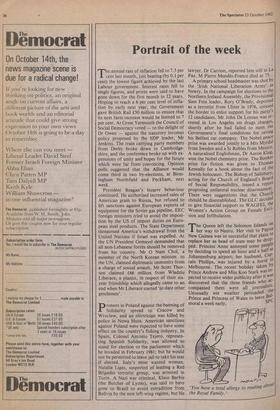Portrait of the week
The annual rate of inflation fell to 7.3 per cent last month, just beating (by 0.1 per cent) the lowest figure achieved by the last Labour government. Interest rates fell to single figures, and prices were said to have gone down for the first month in 12 years. Hoping to reach a 6 per cent level of infla- tion by early next year, the Government gave British Rail £50 million to ensure that its next fares increase would be limited to 7 per cent. At Great Yarmouth the Council of Social Democracy voted — to the delight of Dr Owen — against the statutory incomes policy proposed by the SDP leader, Mr Jenkins. The train carrying party members from Derby broke down in Cambridge- shire, and the conference broke up with ex- pressions of unity and hopes for the future which were far from convincing. Opinion polls suggested that the Alliance would come third in two by-elections, at Birm- ingham Northfield and Peckham, next week.
President Reagan's bizarre behaviour continued. He authorised increased sales of American grain to Russia, but refused to lift sanctions against European exports of equipment for the Soviet gas pipeline. EEC foreign ministers tried to avoid the imposi- tion by the US of import duties on Euro- pean steel products. The State Department threatened America's withdrawal from the United Nations if Israel was expelled. At the UN President Gemayel demanded that all non-Lebanese forces should be removed from his country. Mr 0 Nam Chol, a member of the North Korean mission to the UN, claimed diplomatic immunity from a charge of sexual assault. Mr Scott Thor- son claimed £66 million from Wladzlu Liberace, a pianist, in respect of their six- year friendship which allegedly came to an end when Mr Liberace started 'to date other gentlemen'.
rotests in Poland against the banning of Solidarity spread to Cracow and Wroclaw, and an electrician was killed by police in Nowa Huta. American sanctions against Poland were expected to have some effect on the country's fishing industry. In Spain, Colonel Antonio Tejero, represen- ting Spanish Solidarity, was allowed to stand for election to the parliament which he invaded in February 1981; but he would not be permitted to leave jail to take his seat if elected. Italy's most wanted woman, Natalia Ligas, suspected of leading a Red Brigades terrorist group, was arrested in Turin. A Nazi war criminal, Klaus Barbie (the Butcher of Lyons), was said to have gone to Brazil to avoid extradition from Bolivia by the new left-wing regime, but his lawyer, Dr Carrion, reported him still in La Paz. M Pierre Mendes-France died at 75.
A primary school headmaster was shot by the 'Irish National Liberation Army' In Newry. In the campaign for elections to the Northern Ireland Assembly, the Provisional Sinn Fein leader, Rory O'Brady, deported as a terrorist from Ulster in 1976, crossed the border to enlist support for his party's 12 candidates. Mr John De Lorean was ar- rested in Los Angeles on drugs charges, shortly after he had failed to meet the Government's final conditions for saving his Belfast car company. The Nobel peace prize was awarded jointly to a Mrs Myrdal from Sweden and a Sr Robles from Mexico. A naturalised Englishman, Dr Aaron Klug, won the Nobel chemistry prize. The Booker prize for fiction was given to Thomas Keneally for a book about the fact of the Jewish holocaust. The Bishop of Salisbury, acting for the Church of England's Board of Social Responsibility, issued a report proposing unilateral nuclear disarmament. There were suggestions that the Church should be disestablished. The GLC decided to give financial support to WAGFEI, the Women's Action Group on Female Exci- sion and Infibulation.
The Queen left the Solomon Islands on her way to Nauru. Her visit to Papua New Guinea was so successful that plans to replace her as head of state may be drop- ped. Princess Anne annoyed some people by deciding to spend an hour and a half at Johannesburg airport; her husband, Cap- tain Phillips, was injured by a horse In Melbourne. The recent holiday taken by Prince Andrew and Miss Koo Stark was ex- pected to receive wider publicity after it was discovered that the three friends who ac- companied them were all journalists. Unusually wet weather persuaded the Prince and Princess of Wales to leave Bal- moral a week early. SPL `You have a total allergy to reading ab0111 the Royal Family.'










































 Previous page
Previous page